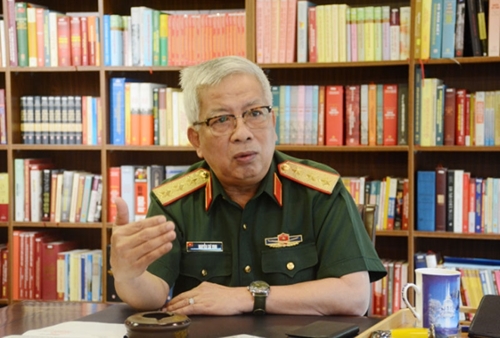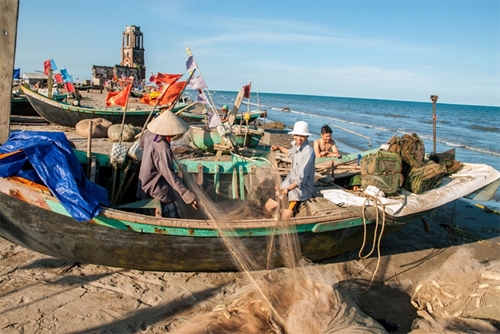Reporter: The adoption of VNLOS could be considered the localization of the UNCLOS in Vietnam. Could you please elaborate more about the policy and principles of Vietnam when applying the above two legal documents to the demarcation of waters and dealing with arising issues at sea in reality, sir?
Senior Lieutenant General Nguyen Chi Vinh: First, There are two basic legal documents that we rely on when exploiting resources, protecting and operating in Vietnamese waters. They are UNCLOS internationally and VNLOS domestically. At present, there are a lot of conventions, international laws or legal documents. They are not issued by any courts, but built based on the commitments of coastal and island states. Due to the characteristics of UNCLOS, each country needs to devise its own law of the sea, but basically all of those laws must comply with and be based on UNCLOS.
    |
 |
|
Senior Lieutenant General Nguyen Chi Vinh |
Generally, international conventions or laws at large, not only on the sea, are loose to some extents, but first of all it is the fact that they have no mechanisms for applying sanctions, just political commitments among countries. In addition, countries can interpret international conventions and laws related to the sea for their own purposes or for their own interests. However, in the end, UNCLOS and some international laws still meet the minimum requirement, which is to raise “common issues that cannot be interpreted otherwise.” For example, UNCLOS defines the continental shelf of a coastal or island state and devises the conduct of parties at sea, etc. We base ourselves on these principles to safeguard our maritime sovereignty.
Joining UNCLOS helps bring us a concept of Vietnam’s sea, but that concept can only be “shaped and measured” thanks to the introduction of VNLOS adopted in 2012. Based on the law, we can define Vietnam’s baselines, internal waters, territorial sea, contiguous zone, exclusive economic zone, continental shelf, islands and archipelago... We also issue regulations on such islands as Con Co, Truong Sa (Spratly Islands) or Phu Quoc in a specific and detailed manner. In other words, the specific application of UNCLOS to Vietnam’s conditions helps us have a clearer definition of sea border and a detailed map of Vietnam’s sea for peaceful business and trade activities and protection of maritime sovereignty.
However, the challenge for VNLOS or laws of the sea of any other countries lies in the overlapping sea areas and different interpretations of the laws, making maritime delimitation very hard to carry out. VNLOS helps us identify overlapping areas, areas with different views and arguments between countries to gradually resolve.
The adoption of VNLOS has completely, clearly and absolutely rejected the illegitimate and unreasonable claims made by some countries. The implementation of the law is not only a process of combat to safeguard Vietnam’s maritime sovereignty and legitimate interests, but also to protect international law, specifically UNCLOS.
Reporter: One of the features of UNCLOS is the provision of rights and equality among countries. When a country intentionally misapplies, or even applies the UNCLOS completely contradictory to the convention’s provisions to claim sovereignty and make illegal conduct, how can countries with their rights and interests infringed do to solve the problem, sir?
Senior Lieutenant General Nguyen Chi Vinh: As I said, UNCLOS is a document without mechanisms to assert penalties, but there are still things that cannot be explained otherwise, especially for those that have joined the convention. UNCLOS is particularly effective to participating countries because of its feature of majority and internationalization.
In relations with countries not participating in UNCLOS, we apply penalties outlined in VNLOS. They must accept and respect VNLOS, comply with our regulations on the management of the continental shelf, extended continental shelf, entry and exit, etc. If they do not comply with these regulations, it means they violate our national interests. VNLOS is based on UNCLOS; therefore, UNCLOS still has its significance in the safeguarding of Vietnam’s sovereignty.
Safeguarding maritime sovereignty on the basis of UNCLOS is above all to consider and develop the sea as a common home. Safeguarding the sea is protecting the marine environment, peaceful business operation and free trade and navigation at sea. It also means to protect the sea surface, the spaces under the sea, and skies over the sea. We protect Vietnam’s sea and contribute to the protection of the world’s common sea and international law.
We are also to protect laws of the sea, including international law and Vietnam’s law. Vietnam has so far participated in many international laws in such areas as freedom of navigation, marine environment protection or anti-piracy.
I want to emphasize that we bring sea-related issues to the international community not for condemning a certain country, but for the fact that the sea is a common property, whose arising issues need handling by the international community. Interpretation of laws and conventions for the sake of just some countries or sovereignty claims can all be refuted by UNCLOS itself. Therefore, UNCLOS is a weapon for the common defense of the sea for the whole humankind and for each and every country.
In addition, Vietnam is determined not to use force. It just chooses a peaceful solution to resolve issues related to sovereignty at sea. Using force is only the last resort.
Reporter: What are the challenges we, Vietnam and other countries in the region, are facing in the conservation and sustainable use of marine resources and in implementing marine economic activities?
Senior Lieutenant General Nguyen Chi Vinh: Over-fishing and destroying marine resources with explosives, chemicals, gill nets, bottom trawling or fishing in the breeding season constitute a dangerous problem. There are also other marine environmental destruction activities such as harms to coral reefs.
Currently, there is a danger to the marine environment in the Truong Sa (Spratly) Islands waters. Some parties have been exploiting the coral reefs excessively to build military bases or airfields. In addition to the negative impacts in terms of security, changes in the structure of the seabed and destruction to the coral reefs, considered “the land of the sea,” have exerted severe impacts on the environment, which is scientifically not capable of self-healing. This is an issue that needs to be combated and every country is responsible for the combat.
Legal fishing is also an issue that countries need to pay attention to. In fact, some fishermen do not know where their countries’ sea borders are, or sometimes, for a living they purposely fish outside their own waters. Therefore, it is the responsibility of each country to strengthen education for fishermen, while resolutely handling violations.
    |
 |
|
Fishermen in Hai Ly commune, Hai Hau district, Nam Dinh province prepare before reaching out to the sea |
As for Vietnamese fishermen, we have supported them to fish legally in many ways, such as providing training courses, installing positioning systems for fishermen for free, offering them loans to build ships and providing manuals to guide them with fishing in the right waters.
For fishermen from other countries illegally fishing in Vietnam’s waters, we are resolute but show our sympathetic and tolerant attitude and do not use force against them. We even provide food, water and oil for them to return safely. We also ask other countries to treat Vietnamese fishermen in the same way.
However, the fact that some countries ignore and allow their fishermen to fish illegally in foreign waters, including the waters of Vietnam, is unacceptable.
Combating acts that intentionally destroy the marine environment and aquatic species is protecting Vietnam’s sea. In reality there are still many obstacles, but we never let go of this issue.
Reporter: What principles should the models of cooperation in marine management and protection follow in order to maintain peace, stability and security at sea, sir?
Senior Lieutenant General Nguyen Chi Vinh: Currently, various individual and groups of countries have established models to protect sea environment, ensure free trade, and conduct anti-piracy, anti-smuggling and anti-trafficking activities at sea. However, it should be noted that those forms of cooperation must also comply with international laws of the sea because the sea is a common property, not of a single country or a group of countries.
The fact shows that countries in the region have been cooperating at both bilateral and multilateral levels on the above issues. It is important that cooperation comes from sincerity and respect for international law.
Reporter: Thank you very much!
Translated by Huu Duong